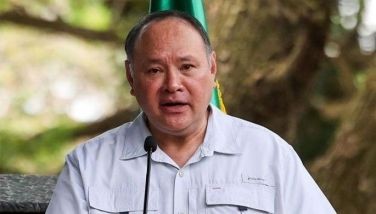Buddhist Magsaysay Awardee wants reunified Korea
August 28, 2002 | 12:00am
 A Korean Buddhist monk and winner of the Ramon Magsaysay award for peace and international understanding for 2002 wants to see the eventual reunification of his country.
A Korean Buddhist monk and winner of the Ramon Magsaysay award for peace and international understanding for 2002 wants to see the eventual reunification of his country.
But Ven Pomnyun Snim, 49, likens the process of reuniting South and North Korea to a winter season "that sometimes becomes cold, very very cold."
Meanwhile, the monk’s co-awardee from Nepal, journalist Bharat Koirala, believes a mix of good news and bad news won’t hurt.
"News should also be about people, the common man," said the awardee for journalism, literature and creative communication arts. "The positive things that could inspire other people ... is missing in our journalism today."
Snim and Koirala arrived yesterday at the Ninoy Aquino International Airport (NAIA). They are two of six 2002 Magsaysay awardees who will receive the award on Aug. 31.
Snim vividly recalled how his heart ached when he left a starving little North Korean child without help just because she was across the border.
"Borders, nations and political ideologies are created for the people, but in fact I saw that these ideas are the source of blocking any kind of help even to a child dying of starvation," said Snim, who was ordained as a monk 12 years ago.
He acknowledged that it was a great honor for him to be selected as a Magsaysay awardee for peace and international understanding, but said the award was not only for him, rather also for everyone who took part in the humanitarian assistance to North Korea and the process of reconciliation.
"I accept this award on behalf of everyone who has been involved in the due course and I would like to express my profound appreciation to the trustees of the Ramon Magsaysay Award Foundation," said Snim, who was garbed in a monk’s attire down to his sandals.
Snim, who has chosen monkhood over worldly pleasures and material things, said his life is devoted to helping people, especially children, and to addressing the issue of humanity which is related to environmental degradation.
Snim’s arrival followed that of another Magsaysay awardee, Indian national Sandeep Pandey, who turned his back on the good life in order to help bring about a radical change of perspective between the rich and the poor, where the former are untouchable while the latter are always under the mercy of the elite.
Pandey tries to convey the message to his country’s youth to work for a change in traditional Indian values, where the rich belong to the upper class and, therefore, beyond the coverage of existing laws and rules governing society.
Koirala, meanwhile, was chosen as Magsaysay awardee for "developing professional journalism in Nepal and unleashing the democratizing powers of a free media."
The 60-year-old Koirala, who arrived at NAIA accompanied by his wife Jo-Anne, stressed that journalists should pay more attention to the inspiring, relevant and important things that the ordinary man does in his rural community.
This is the new definition of journalism, he said, different from what was derived from the West, which is practiced the world over.
He likened Nepalese media to the rambunctious Philippine media, and urged journalists to be true in their profession.
Koirala noted that he has been to Manila several times, especially in the 80s when he met and worked with several noted Filipino journalists. In fact, Koirala said, much of the work that he did in Nepal he learned from the Philippines.
He has been following the Philippine media ever since and observed that the local media give a premium on politics, crime and drugs. "But you do have a very vibrant press," he said.
It is important to write about politics, he said, especially "so that there would be reforms and so that everything improves. The ultimate goal is to improve the lives of the people, you see."
But what could be deemed important politics in the national level may not necessarily interest people in the rural areas. "You have to be able to reach them too," said the journalist who began his career in the government-controlled Rising Nepal and its sister publication, the Nepali-language Gorakhapatra.
The arrival of the three Magsaysay awardees followed that of Dr. Ruth Pfau, a German-born Pakistani citizen who emulates the works of the late Mother Teresa of Calcutta. She is the recipient for her lifelong battle to eradicate leprosy and its corresponding stigma in Pakistan.
While in Manila, the Magsaysay awardees will deliver various public lectures to share their experiences and exchange ideas with individuals and organizations in similar fields.
The awardees were welcomed at the NAIA by Carmencita Abella, president of the Ramon Magsaysay Award Foundation.
Supreme Court Chief Justice Hilario Davide Jr. is this year’s Magsaysay awardee for government service. Dr. Cynthia Maung of Thailand is the sixth awardee, for community leadership.
Award rites are set Saturday at the Cultural Center of the Philippines, with President Arroyo as guest of honor.
BrandSpace Articles
<
>
- Latest
- Trending
Trending
Latest
Trending
Latest
Recommended




























